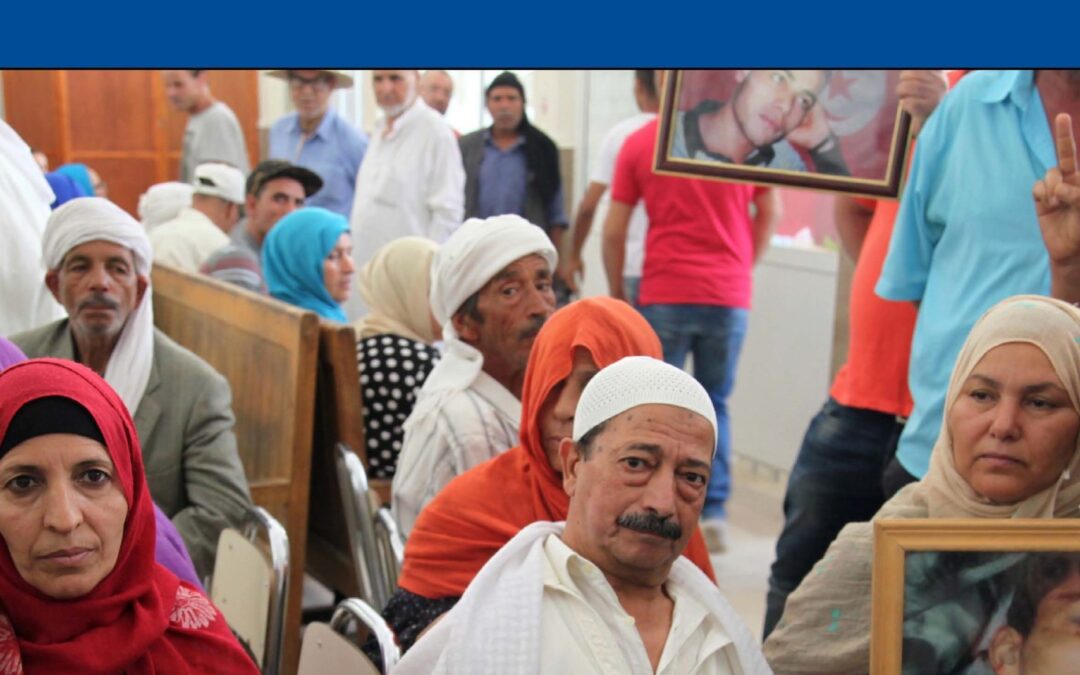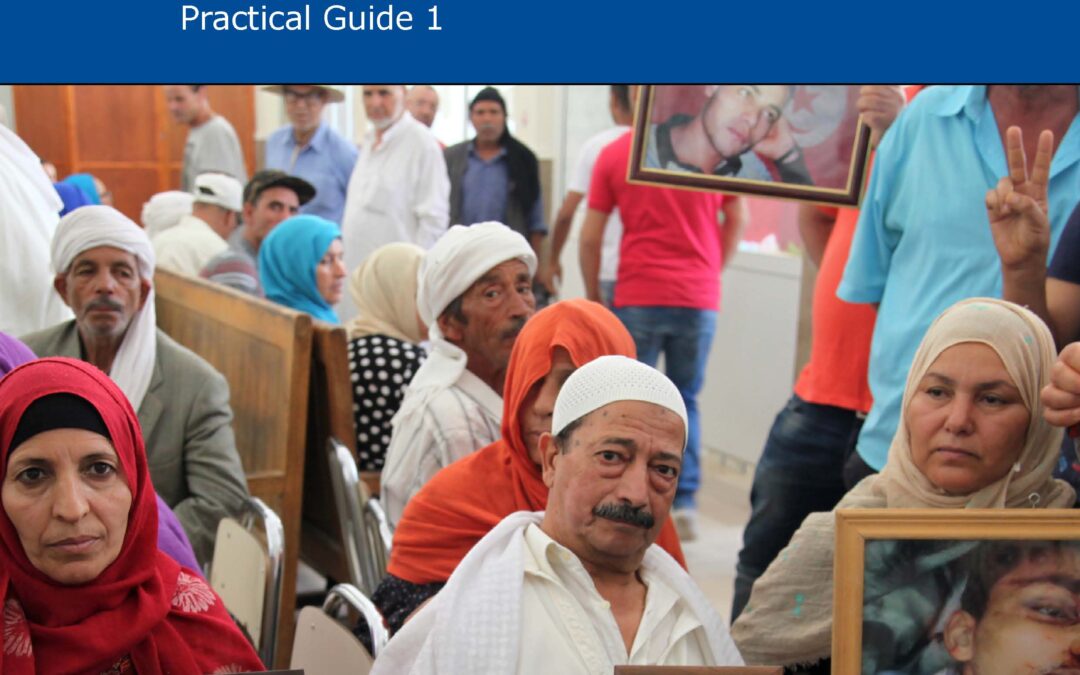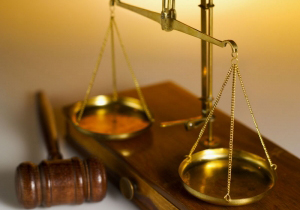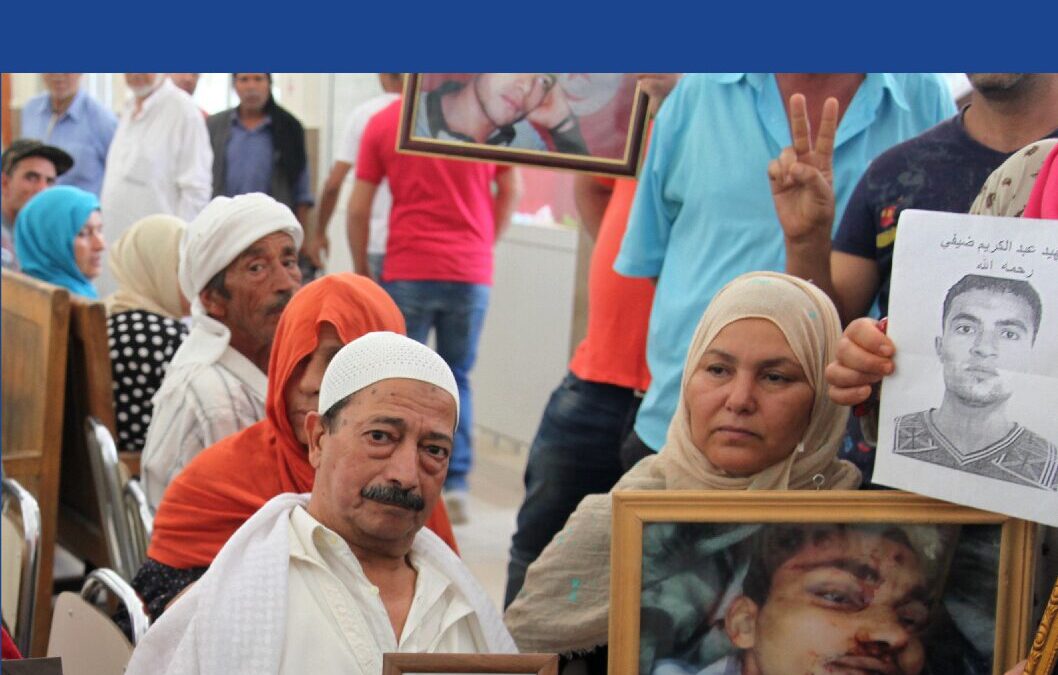
Dec 9, 2020
The ICJ today released two practical guides aimed to assist practitioners to advance accountability and justice through the Specialized Criminal Chambers (SCC) in Tunisia.
Practical Guide 2 addresses the investigation and prosecution of gross human rights violations under Tunisian and international law, while Practical Guide 3 covers the principles and best practices on evidence in the administration of justice. Practical Guide 1, which was released in December 2019, considered the role of international law and standards in proceedings before the SCC.
Trials before the SCC started in May 2018. Since the opening of the first hearing, it has been evident that gaps in the rules and procedures governing the investigation, prosecution and evidence in the SCC cases have served to endanger efforts to hold perpetrators to account and bring justice to victims for past violations of human rights.
“The credibility of SCC trials largely depends on their capacity to ensure effective and fair investigations and prosecutions based on strong, compelling and untainted evidence,” said Said Benarbia, the ICJ’s MENA Programme Director.
“These practical guides should serve to assist those working in the Tunisian justice sector to make the most of this opportunity to end impunity and enable victims to obtain redress, all while ensuring the highest possible fair trial standards.”
Practical Guide 2 sets out the international law and standards governing the obligation to investigate and prosecute gross human rights violations, the accused’s right to a fair trial, and the rights of victims and their families to participate in proceedings and to an effective remedy.
Practical Guide 3 describes the principles and best practices under international law that apply to the collection, admissibility and evaluation of evidence in the investigation and prosecution of gross human rights violations.
Both guides aim to provide options for applying Tunisia’s law and procedures on investigation, prosecution, and evidence in SCC cases in compliance with international law and standards.
“Tunisians have waited so long to see justice for the many human rights abuses that were committed in the past,” said Kate Vigneswaran, the ICJ’s MENA Programme Senior Legal Adviser.
“The SCC holds out the promise that this wait might end, but only if the trials are grounded on solid proceedings that put accountability, human rights and fairness at the forefront.”
Contact
Said Benarbia, Director, ICJ Middle East and North Africa Programme, t: +41-22-979-3817; e: said.benarbia(a)icj.org
Kate Vigneswaran, Senior Legal Adviser, ICJ Middle East and North Africa Programme, t: +31-62-489-4664; e: kate.vigneswaran(a)icj.org
Background information
The SCC were established in 2014 to adjudicate cases involving alleged “gross human rights violations” between 1955 and 2013 referred by the Truth and Dignity Commission (Instance Verité et Dignité, IVD).
At the end of its mandate in December 2018, the IVD’s referred to the SCC 200 cases of arbitrary deprivations of life, arbitrary deprivations of liberty, torture and other ill-treatment, enforced disappearance, rape and sexual assault and crimes against humanity committed by the past regime.
Practical Guides 2 and 3 are preceded by Practical Guide 1 on The Adjudication of Crimes Under Tunisian and International Law, which examines the principles of legality and non-retroactivity under international law and their application in the domestic system, and conducts an analysis of the definition of crimes under Tunisian law vis-à-vis international law for arbitrary deprivations of life, arbitrary deprivations of liberty, torture and other ill-treatment, enforced disappearance, rape and sexual assault and crimes against humanity. The three Guides will also be followed by Practical Guide 4 on modes of liability under Tunisian and international law.
In a briefing paper published in October 2020, the ICJ also called on the Tunisian authorities to undertake substantial legal and policy reforms with a view to strengthening accountability and removing the obstacles that impede the SCC work.
Download
Tunisia-SSC guide series no2-Publications-Reports-Thematic reports-2020-ENG (Guide 2 in English, PDF)
Tunisia-SSC guide series no3-Publications-Reports-Thematic reports-2020-ENG (Guide 3 in English, PDF)
Tunisia-Launch Guides-News-2020-ARA (story in Arabic, PDF)
Tunisia-SSC guide series no2-Publications-Reports-Thematic reports-2020-ARA (Guide 2 in Arabic, PDF)
Tunisia-SSC guide series no3-Publications-Reports-Thematic reports-2020-ARA (Guide 3 in Arabic, PDF)

Dec 11, 2019
Today, the ICJ released Practical Guide 1 on the adjudication of crimes under Tunisian and international law, the first guide in a four-part series on accountability for crimes under international law and the Tunisian Specialized Criminal Chambers (SCC).
Practical Guide 1 addresses the application of Tunisian law governing the penalization of crimes and modes of liability, in relation to international law and standards.
The SCC were established in 2014 to adjudicate cases involving alleged “gross human rights violations” between 1955 and 2013 referred by the Truth and Dignity Commission.
“Tunisia has obligations under international law to ensure justice for victims and combat impunity for the egregious human rights violations that were committed in the past,” said Saïd Benarbia, ICJ MENA Programme Director.
“International law is directly relevant to the work of the SCC, particularly since the gross human rights violations over which the SCC have jurisdiction are either not defined in domestic law or are defined inconsistently with the definitions under international law binding Tunisia,” he added.
The Practical Guide sets out relevant international law and correlates it to related provisions of Tunisian law.
The Guide examines the principles of legality and non-retroactivity under international law and their application in the domestic system, and conducts an analysis of the definition of crimes under domestic law vis-à-vis international law for arbitrary deprivations of life, arbitrary deprivations of liberty, torture and other ill-treatment, enforced disappearance, rape and sexual assault and crimes against humanity.
Although the transitional justice framework governing the SCC gives judges some tools to remedy the gaps and inconsistencies in domestic law, legislative reform is needed to ensure Tunisia is in compliance with its obligation to penalize crimes under international law and investigate, prosecute and remedy them whenever they are committed, whether pre- or post-2011.
“Tunisian legislators gave the SCC the mandate to adjudicate gross human rights violations but haven’t remedied all the gaps and inconsistencies in the domestic law the SCC were tasked with applying,” said Valentina Cadelo, ICJ MENA Programme Associate Legal Adviser.
“Tunisian authorities must now take steps to reform the law to guarantee that all perpetrators of gross human rights violations can be held criminally responsible in any Tunisian court,” she added.
Practical Guide 1 aims to:
- Explain international law relevant to the SCC, including the application of the principles of legality and non-retroactivity, statutory limitations and crimes under international law, to guarantee justice for victims of gross human rights violations and hold perpetrators accountable, while meeting international fair trial standards.
- Correlate domestic definitions of crimes with the definitions of crimes under international law applicable at the time the alleged conduct occurred.
- Describe the requirement that penalties applied upon conviction be based in law and correspond to the gravity of the crimes.
Contact
Saïd Benarbia, Director of the ICJ Middle East and North Africa Programme, t: +41.22.979.3817, e: said.benarbia(a)icj.org
Valentina Cadelo, ICJ Associate Legal Adviser, t: +21671962287, e: valentina.cadelo(a)icj.org , twitter: @ValentinaCadelo
Download
Tunisia-Accountability series-Publications-Reports-Thematic reports-2019-ENG (full report in English, PDF)
Tunisia-Accountability series-News-2019-ARA (full story in Arabic, PDF)
Tunisia-Accountability series-Publications-Reports-Thematic reports-2019-ARA (full report in Arabic, PDF)

Aug 13, 2001
The judiciary in Iran is not free from government or religious influence. The judiciary and law enforcement agencies continue to serve as the main tools of oppression in the country.








